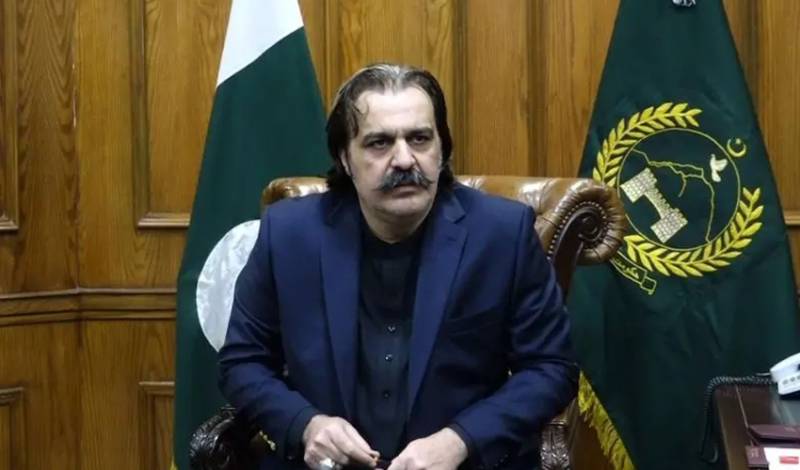
In the politically vibrant landscape of Pakistan, leadership often pivots on the axis of promises and actions. Ali Amin Gandapur, after assuming the office of Chief Minister Khyber Pakhtunkhwa, entered with a series of high expectations from the populace and a manifesto brimming with ambitious pledges. However, as time has unfolded, the contrast between Gandapur's promises and his subsequent actions has become a focal point of public discourse.
Ali Amin Gandapur's rise to the office of Chief Minister was accompanied by bold declarations and high expectations. Among his promises was a commitment to ending militancy, ensuring civilian supremacy, and implementing sweeping administrative changes. However, the reality of his tenure paints a different picture, marked by unmet promises and actions that contradict his stated objectives.
Gandapur made a strong pledge to end militancy, boldly stating that even army trucks would be subject to civilian checks. However, the situation in his own district, Dera Ismail Khan, tells a different story. The area is now virtually under the control of militants. A local Member of Parliament from the district has openly stated on the floor of the house that he cannot safely visit his own constituency. This stark contrast between Gandapur's rhetoric and the ground reality highlights a significant failure in addressing the security concerns of his region.
Despite his vocal support for civilian supremacy, Gandapur's actions have undermined this principle. He attended a meeting at the Corps Commander's house with his entire cabinet, an act seen as diminishing the stature of the Chief Minister's office. This move not only contradicts his public stance but also raises questions about his commitment to maintaining the autonomy and dignity of civilian governance.
Gandapur demanded the immediate transfer of the KP Chief Secretary, showcasing a desire for swift administrative reforms. However, his performance in this area has been lackluster. He has been unable to replace even the Deputy Commissioner of Peshawar, who has been accused of election rigging against PTI candidates. This failure to implement critical changes within the administrative framework signals a significant gap between his promises and his capacity to deliver. There is significant discontent within PTI circles, as evidenced by a video circulating on social media. The video shows a provincial assembly candidate walking out of a meeting in protest because the meeting was attended by the DC, whom the candidate accused of undermining the public mandate.
One of Gandapur's notable promises was to abolish all First Information Reports (FIRs) launched against PTI workers before the elections. However, no significant progress has been made in this regard. Adding insult to injury, some PTI workers have been detained by security agencies since he assumed office, further eroding the trust and morale within his own party ranks.
Gandapur threatened to block the supply of electricity to the rest of the country if power was not supplied adequately to the people of KP and if dues owed to the province for power generation were not paid by the federal government. Despite this aggressive stance, he has failed to assert control over power distribution companies. The province continues to experience electricity shortages. In some areas, the duration of load shedding has increased despite the Chief Minister’s assurances that it would be reduced. Additionally, the promised financial dues remain unsettled, underscoring another instance where his bold promises have not translated into effective action.
So far, the only promise Gandapur has fulfilled is the relaunch of the health card scheme in the province. Many political observers believe this scheme is the primary reason PTI has been elected for a third consecutive term.
However, party workers are dissatisfied with Gandapur, accusing him of giving fiery speeches without taking concrete actions to secure Imran Khan's release from prison. Some even accuse him of playing a double game, making false claims in public while privately following the directives of powerful circles.
The discrepancy between Gandapur's promises and his actions has stirred significant public debate. Many supporters feel disillusioned, while critics argue that the gap highlights a broader issue of political accountability and effective governance. The initial enthusiasm that greeted Gandapur’s vision has given way to skepticism and, in some cases, outright opposition.
Ali Amin Gandapur's tenure as Chief Minister is characterized by a series of unfulfilled promises and actions that often contradict his public statements. His inability to combat militancy effectively, uphold civilian supremacy, implement administrative changes, support PTI workers, and address power distribution issues underscores a significant gap between his rhetoric and reality. As public disillusionment grows, it becomes increasingly critical for Gandapur to align his actions with his promises to restore confidence and deliver on the expectations that brought him to power. As the public continues to hold their leaders accountable, the onus is on Gandapur and his administration to bridge this gap and work towards tangible improvements that align with their initial commitments.

